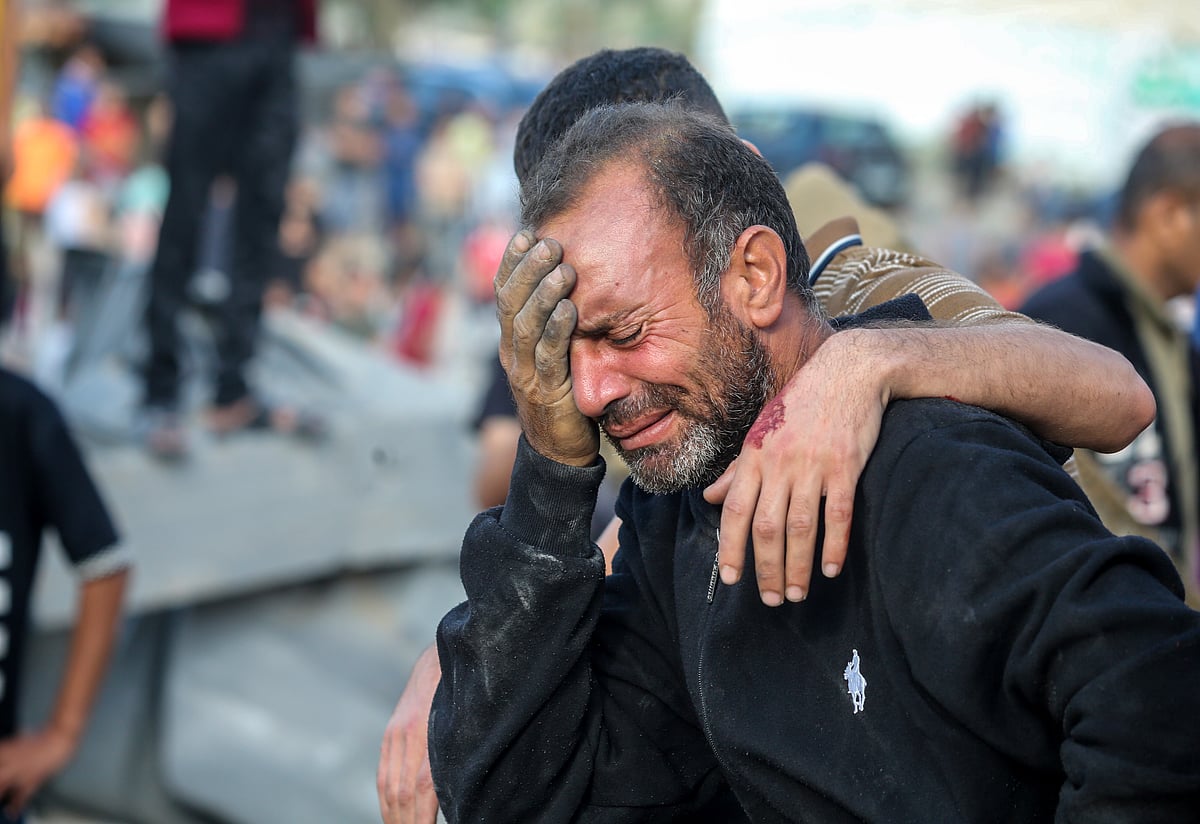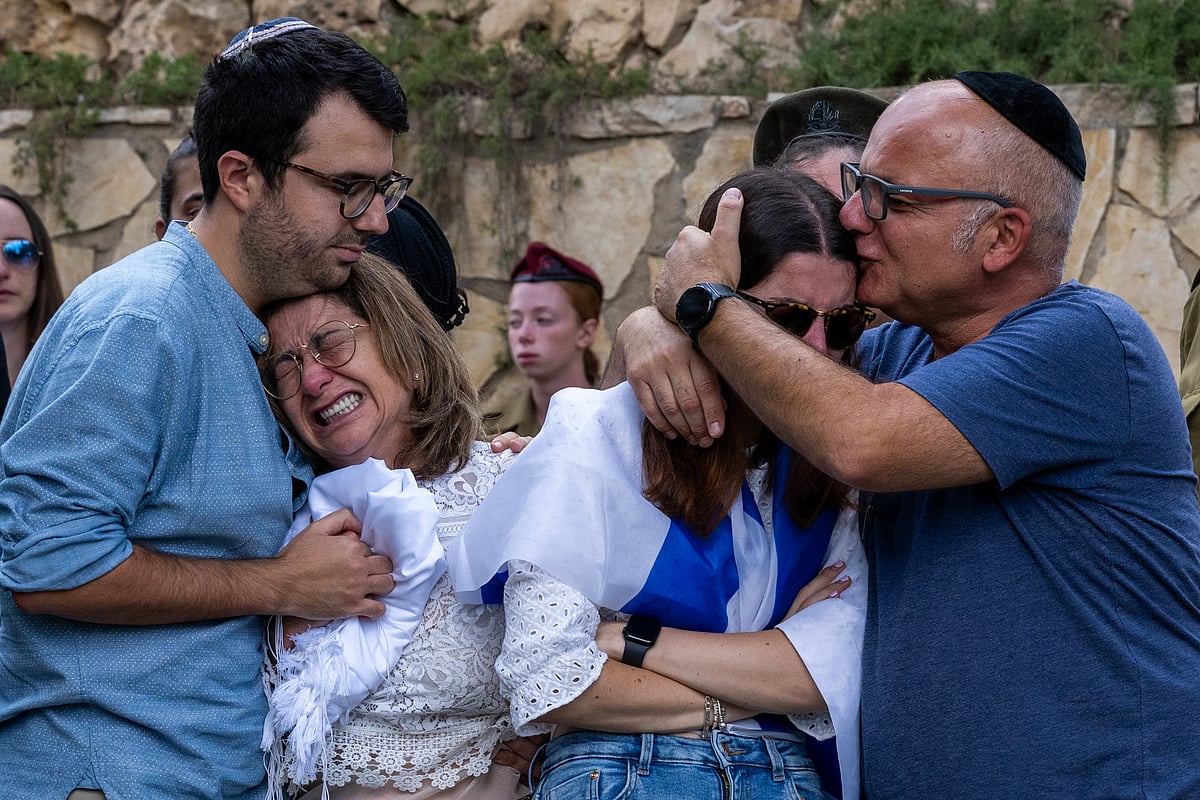Israel, Gaza: Any chance of peace in West Asia?
After the Hamas attack, Israel launched massive air raids on the Gaza Strip. Experts warn the conflict could spread across the region

"This is the worst and most difficult conflict we have seen since the Israeli state was established in 1948," says Pnina Sharvit Baruch of the Institute for National Security Studies, a think tank at Tel Aviv University in Israel.
Israelis and Palestinians lay claim to areas in the stretch of land that extends from the Mediterranean to the River Jordan. Half of this area is desert, and the whole is about 400 km long and up to 100 km wide. Holy sites of Jews, Christians and Muslims are located here.
Since the founding of the Israeli state in 1948, Israel, the Palestinians and the neighboring Arab states have fought several wars. About 700,000 Palestinians were displaced in 1948 alone, the beginning of what is referred to in Arabic as the Nakba (the catastrophe). In addition, by 1972, some 800,000 Jews fled or were expelled from Arab and North African states after the 1948 Israeli-Arab war.
To this day, the West Bank remains under Israeli occupation. Many Palestinians continue to call for their own state, the return of refugees and the withdrawal of at least some of the approximately 700,000 Israeli settlers from the West Bank and East Jerusalem, whose settlements are illegal under international law according to the United Nations and as such have received widespread international condemnation. "The occupation is the main problem," says Palestinian political scientist Shihab. "The magic formula for a solution to the conflict would be: the occupation ends."
For Israel, which faces repeated attacks and assaults, especially by Hamas, recognition by Arab states and a guarantee of its own security are crucial. The Israeli magic formula is: only when terrorism ends is peace at all possible.

On both sides, however, hardliners have recently gained influence and are not prepared to make any concessions. Hamas, for example, denies Israel's right to exist and wants to prevent a peaceful compromise. It is classified as a terrorist organisation by the United States and the European Union. Since 2007, it has ruled the Gaza Strip, though the entire area has been sealed off under total Israeli blockade.
Some experts warn that the situation could now escalate into a war that engulfs the entire region.
Is peace possible despite everything?
But the opposite is also possible, said Margret Johannsen in an interview with DW. The Hamburg-based political scientist has been researching the West Asia conflict for decades and still believes in the possibility of a peace agreement.
Despite the many deaths as a result of Hamas militancy and the Israeli bombardment of Gaza, Johannsen says, "This is so horrendous that I would imagine that this will be a wake-up call. And I can only hope it will be heard."
A compromise could be reached within three years, she believes. "The wounds have to heal. You can only hope that there are people who will make the effort to mediate. You can't do it without mediation." Johannsen sees powers such as China and India or African countries as having a duty here.
The two-state solution
For decades, the two-state solution was considered the only way to pacify the region. As early as 1947, the UN had proposed a partition plan for a Jewish and an Arab state on the territory of Palestine. However, the Arab side rejected this plan which would also have put the city of Jerusalem under international administration.
With the Oslo Accords of 1993, a two-state solution seemed within reach for the first time since 1948. The Israeli army withdrew from parts of the West Bank. A newly created Palestinian Authority (PA) could now administer about one-fifth of the territory, and it gained partial control over another fifth.
However, political provocations, terrorist attacks and the construction of more settlements, but above all the assassination of Israeli Prime Minister Yitzhak Rabin in 1995 by a far-right Israeli extremist, destroyed hopes that at some point the way might be clear for a two-state solution. On both sides, opponents of the agreements succeeded in preventing further treaties.
"The two-state solution is still a good idea," Israeli political expert Mairav Zonzsein of the International Crisis Group said. "Whether it can be implemented depends on whether the two sides and the international community are willing to put their political capital and energy into making it happen. Many people today do not believe this is possible."

According to a Pew Research Center poll earlier this year, only about one in three Israelis believe peaceful coexistence with an independent Palestinian state is possible. Ten years ago, one in two Israelis said they believed in the two-state solution. Now, after the Hamas terrorist attack, the numbers are likely to be even lower, because many more secular and politically left-wing Israelis have also lost faith in peace.
The situation is similar in the West Bank, Gaza and East Jerusalem, where the Gallup polling institute conducted surveys before the Hamas attacks. According to the results, only one in four Palestinians there favours a two-state solution. In 2012, six out of ten Palestinians were still in favour.
Two peoples, one state?
Johannsen advocates a one-state solution. "Not now, the dust will have to settle first. But in the long term, that would be something I would advocate." If Israelis and Palestinians lived together in one state, then Israeli settlers could also stay where they want, Johannsen said.
There are usually three models proposed for what such a state might look like: A true unitary state with a strong central government, such as in France; or a federal state with a weak central government, modelled on Belgium, for example, giving Jewish and Palestinian regions wide-ranging devolved powers; or a confederation or union of states would involve two territories with open borders, with a joint Israeli and Palestinian government responsible only for a limited number of areas, such as foreign trade and external security.
But Pnina Sharvit Baruch of the Institute for National Security Studies in Tel Aviv sees all of these proposals as unworkable. More to the point, "Having a unified territory with an equal number of Palestinians and Jews, that's a recipe for civil war." Because of the "immense hostility" between the two sides, she said, adding that she had come to this conclusion even before the Hamas attacks.
Nearly half of the residents in the territory of Israel, Gaza, East Jerusalem and the West Bank are Arabs — including one-fifth of Israel's population is of Palestinian heritage, and many Israeli Jews themselves are of Arab heritage from across the wider Arab world. Many Israelis therefore fear that a joint state with the Palestinians would lose its Jewish identity, even if the violence ceased.
Some right-wing nationalist Israelis argue for an Israeli state in which Palestinians would exercise more autonomy than they do now, but only in isolated parts of the West Bank. But that, in turn, Palestinians say, would not then be a democratic state in which they would be granted full civil rights.
An unsolvable problem?
The conflict between Israelis and Palestinians seems to be an unsolvable problem. "As complicated as it may seem to many people, it's actually very, very simple," said Israeli analyst Mairav Zonzsein. "You have two peoples who have to live here in peace and security. And no amount of terrorism or military power, no matter how great, has moved us forward yet."
Follow us on: Facebook, Twitter, Google News, Instagram
Join our official telegram channel (@nationalherald) and stay updated with the latest headlines